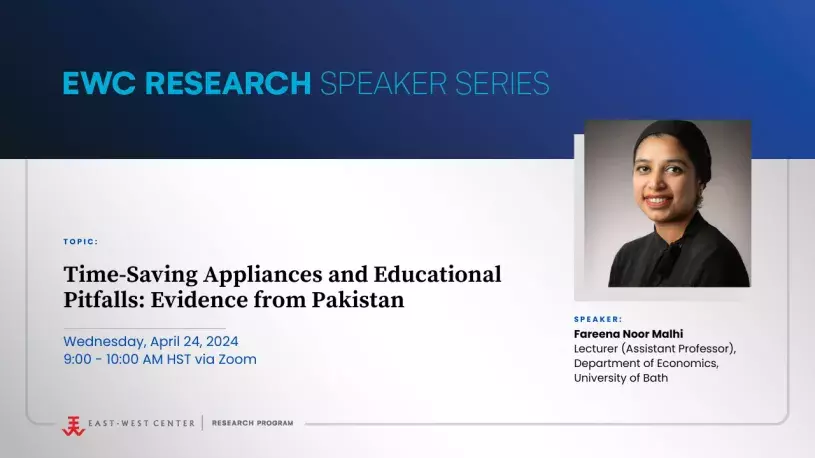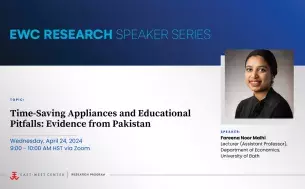Error message

OFFICE/DEPARTMENT
EWC Research Program Speaker Series
Wednesday, April 24, 2024
9:00 - 10:00 a.m. HST
featuring
Fareena Noor Malhi, Lecturer (Assistant Professor), Department of Economics, University of Bath
This study investigates whether access to time-saving appliances (TSA) aids children, especially girls in overcoming educational pitfalls, particularly during the challenging transition from primary to secondary and upper secondary schools in South Asia, marked by high dropout rates. Despite established evidence linking TSA access to increased educational enrollment, we focus on its specific impact on reducing dropout rates and their transition from one schooling level to another which is marked by the highest dropout rates. Utilizing instrumental variable methodology to address endogeneity, our findings reveal a causal relationship between owning freezers and washing machines and successful transitions for both genders. The village-level ownership of these appliances among childless families serves as a crucial instrument. Additionally, we analyze the mechanisms through which time-saving appliances influence upward transitions and assess result heterogeneity based on maternal decision-making authority, parental educational aspirations, and sibling gender composition within households. This nuanced exploration provides valuable insights for policymakers and practitioners addressing educational challenges in the region.
Fareena Noor Malhi currently serves as a Lecturer (Assistant Professor) at the Department of Economics, University of Bath. With over 7 years of academic and teaching experience in Pakistan, she has contributed to institutions such as the Lahore School of Economics and the University of the Punjab. Dr. Malhi earned her PhD from American University as a Fulbright Scholar. As an applied microeconomist, she specializes in behavioral development economics, particularly focusing on gender dynamics. Her research is dedicated to uncovering the root causes of low female labor force participation and the prevalence of out-of-school children in developing countries. Dr. Malhi explores the efficacy of behavioral interventions and the application of machine learning to address these challenges. Her professional background also includes working with esteemed international organizations such as the United Nations and Oxfam America.
The views expressed are those of the speaker and do not necessarily reflect East-West Center policies or positions.
EWC Research Program Speaker Series
Wednesday, April 24, 2024
9:00 - 10:00 a.m. HST
featuring
Fareena Noor Malhi, Lecturer (Assistant Professor), Department of Economics, University of Bath
This study investigates whether access to time-saving appliances (TSA) aids children, especially girls in overcoming educational pitfalls, particularly during the challenging transition from primary to secondary and upper secondary schools in South Asia, marked by high dropout rates. Despite established evidence linking TSA access to increased educational enrollment, we focus on its specific impact on reducing dropout rates and their transition from one schooling level to another which is marked by the highest dropout rates. Utilizing instrumental variable methodology to address endogeneity, our findings reveal a causal relationship between owning freezers and washing machines and successful transitions for both genders. The village-level ownership of these appliances among childless families serves as a crucial instrument. Additionally, we analyze the mechanisms through which time-saving appliances influence upward transitions and assess result heterogeneity based on maternal decision-making authority, parental educational aspirations, and sibling gender composition within households. This nuanced exploration provides valuable insights for policymakers and practitioners addressing educational challenges in the region.
Fareena Noor Malhi currently serves as a Lecturer (Assistant Professor) at the Department of Economics, University of Bath. With over 7 years of academic and teaching experience in Pakistan, she has contributed to institutions such as the Lahore School of Economics and the University of the Punjab. Dr. Malhi earned her PhD from American University as a Fulbright Scholar. As an applied microeconomist, she specializes in behavioral development economics, particularly focusing on gender dynamics. Her research is dedicated to uncovering the root causes of low female labor force participation and the prevalence of out-of-school children in developing countries. Dr. Malhi explores the efficacy of behavioral interventions and the application of machine learning to address these challenges. Her professional background also includes working with esteemed international organizations such as the United Nations and Oxfam America.
The views expressed are those of the speaker and do not necessarily reflect East-West Center policies or positions.








